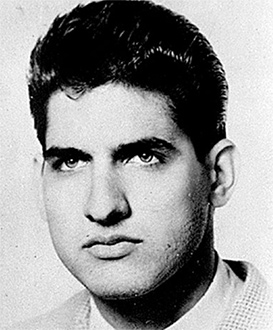Hugo Spadafora
Hugo Spadafora was a prominent Panamanian physician, politician, and guerrilla fighter, known for his fervent opposition to the military dictatorship in Panama and his mysterious murder in 1985, which sparked international outrage and contributed to the eventual downfall of General Manuel Noriega's regime. Spadafora's life and death remain emblematic of the struggle for democracy and human rights in Latin America during the late 20th century.
Early Life and Education[edit | edit source]
Hugo Spadafora was born in the town of Chitré, Panama, in 1940. From a young age, he was exposed to the political unrest in Panama and the broader Latin American region. He pursued medical studies, graduating as a doctor, which allowed him to combine his professional career with his political activism.
Political and Military Involvement[edit | edit source]
Spadafora's political activism began in earnest while he was a student, and he was deeply involved in movements opposing military rule in Panama. His opposition to authoritarianism wasn't limited to his home country; he also played a significant role in international conflicts. Notably, he joined the Sandinista National Liberation Front (FSLN) in Nicaragua, fighting against the Somoza dictatorship. His involvement in Nicaragua was a testament to his commitment to fighting tyranny beyond Panama's borders.
Opposition to Noriega[edit | edit source]
Upon returning to Panama, Spadafora became one of the most vocal critics of General Manuel Noriega, who had become the de facto ruler of Panama. Spadafora accused Noriega and his regime of involvement in drug trafficking, corruption, and severe human rights abuses. His outspoken criticism made him a target for the regime, leading to threats against his life and safety.
Murder and Aftermath[edit | edit source]
On September 13, 1985, Hugo Spadafora was abducted from a bus near the Costa Rican border, and his decapitated body was found the next day in a duffel bag. His murder caused a national and international uproar, highlighting the brutality of the Noriega regime and the dangerous state of political dissent in Panama. Despite widespread suspicion and evidence pointing towards the involvement of Noriega's military forces, the investigation into Spadafora's murder was obstructed, and justice was delayed for years.
Legacy[edit | edit source]
Hugo Spadafora's death became a rallying point for opposition against Noriega, contributing to the international pressure that eventually led to the U.S. invasion of Panama in 1989 and Noriega's capture. Spadafora is remembered as a martyr for democracy and human rights in Panama and Latin America. His life and death continue to inspire those fighting against oppression and corruption.
See Also[edit | edit source]
Search WikiMD
Ad.Tired of being Overweight? Try W8MD's physician weight loss program.
Semaglutide (Ozempic / Wegovy and Tirzepatide (Mounjaro / Zepbound) available.
Advertise on WikiMD
|
WikiMD's Wellness Encyclopedia |
| Let Food Be Thy Medicine Medicine Thy Food - Hippocrates |
Translate this page: - East Asian
中文,
日本,
한국어,
South Asian
हिन्दी,
தமிழ்,
తెలుగు,
Urdu,
ಕನ್ನಡ,
Southeast Asian
Indonesian,
Vietnamese,
Thai,
မြန်မာဘာသာ,
বাংলা
European
español,
Deutsch,
français,
Greek,
português do Brasil,
polski,
română,
русский,
Nederlands,
norsk,
svenska,
suomi,
Italian
Middle Eastern & African
عربى,
Turkish,
Persian,
Hebrew,
Afrikaans,
isiZulu,
Kiswahili,
Other
Bulgarian,
Hungarian,
Czech,
Swedish,
മലയാളം,
मराठी,
ਪੰਜਾਬੀ,
ગુજરાતી,
Portuguese,
Ukrainian
Medical Disclaimer: WikiMD is not a substitute for professional medical advice. The information on WikiMD is provided as an information resource only, may be incorrect, outdated or misleading, and is not to be used or relied on for any diagnostic or treatment purposes. Please consult your health care provider before making any healthcare decisions or for guidance about a specific medical condition. WikiMD expressly disclaims responsibility, and shall have no liability, for any damages, loss, injury, or liability whatsoever suffered as a result of your reliance on the information contained in this site. By visiting this site you agree to the foregoing terms and conditions, which may from time to time be changed or supplemented by WikiMD. If you do not agree to the foregoing terms and conditions, you should not enter or use this site. See full disclaimer.
Credits:Most images are courtesy of Wikimedia commons, and templates Wikipedia, licensed under CC BY SA or similar.
Contributors: Prab R. Tumpati, MD

